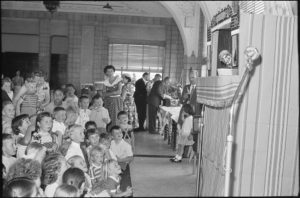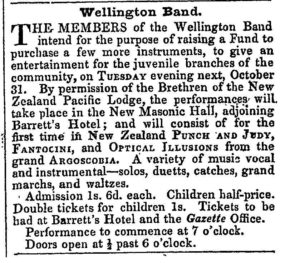1843: First Punch and Judy in NZ
December 30, 2019
By AHNZ
 The ‘Punch and Judy show’ goes way back to the roots of our modern culture. First performed in England in 1662, first performed in New Zealand in 1843¹. A common thread that primes us all as children, through art, to think about our society and culture in a particular way.
The ‘Punch and Judy show’ goes way back to the roots of our modern culture. First performed in England in 1662, first performed in New Zealand in 1843¹. A common thread that primes us all as children, through art, to think about our society and culture in a particular way.
From an 1878 synopsis….
“An opportunity is now afforded the youngsters of the Thames of seeing the diverting comedy of Punch and Judy….”“Punch, at length exasperated, seizes another bludgeon, soon vanquishes his already weakened foe, and lays her prostrate at his feet; then, seizing the murdered infant and the expiring mother, he flings them both out of the window into the street. The dead bodies having been found, police officers enter the dwelling of Punch…”
“Punch is left triumphant over Doctors, Death, and the Devil. The curtain falls amid the shouts of the conqueror, who, on his victorious staff, lifts on high his vanquished foe.”- Thames Star
“An exact likeness of Punchinello, or Punch, has been found on the frescoes of Pompeii.” – Durant (1944)
 Note: This is an advertisement to interest and attract New Zealand parents to send their children along to see. A show the parents would know from the old country as youths and feel some nostalgia toward.
Note: This is an advertisement to interest and attract New Zealand parents to send their children along to see. A show the parents would know from the old country as youths and feel some nostalgia toward.
It is essentially the same plot-line the 1950s kids in this other image (top) are being exposed to. Likewise, children all the way up to the Millennial generation and today. Think about the moral lesson being woven into our domestic identity by this constant re-enforcing to our kids!
Punch & Judy, a children’s puppet show still performed today dating back some 400 years. What lesson does it re-enforce? What catharsis does it provide our culture? I can’t back this up yet but I have speculations…
It’s a tale of domestic violence, police enforcement, and judgement. Children learn that the father, Mr Punch, is a violent husband who abuses and neglects his baby. They learn to side with this misogynistic stick-wielder and call out a warning to him as civil authority (police) and nature (crocodile) try to give the cowardly bully his comeuppance.
I think generations of New Zealanders have been fed this show and it’s entertaining and cathartic because it makes fun of what they experience at home. That men cannot parent. Husbands and wives are at odds. Police are dangerous but of no help to the people. Domestic violence is normal. The Patriarch always wins, even in the end, and is to be identified with.
Next time I write this I’ll try to back this up with some facts. It would be wonderful to know if the show I saw as a kid matches what an earlier generation saw. Did the 1906 kids in this photo get the same message as someone watching in their school hall in 1996? How about 1840 or 1700? Comments welcome.
—
Image ref. New Zealand Gazette and Wellington Spectator; 1843
Note: “The exact resemblance of the figure of Pulcinello is said to have been found among the frescoes of Pompeii.” Lectures on Dramatic Art and Literature, Schlegel (1815,) Project Gutenberg
1 First performance in NZ was on 31 October, 1843; ibid
Image ref. Auckland Dutch Club party at Farmers, Auckland; 1959 (part of a series); Auckland Libraries Heritage Collections
Image ref. Scenes from Punch and Judy; Landern slides; c.1900; Museum of New Zealand
Ref. Story of Civilisation, Vol 3. Will Durant (1944) referencing p202 Lectures on Draitiatic Art and Literature, August Schlegel (ee.1809) who lectured that “The exact resemblance of the figure of Pulcinello is said to have been found among the frescoes of Pompeii.” Durant has exaggerated this “said to have” but I’d like to believe him.
 Like Comment Share
Like Comment Share





